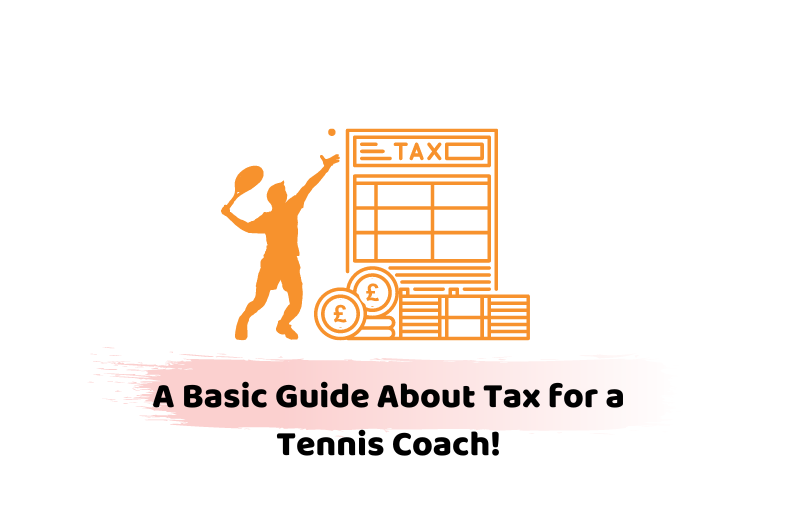If you are a coach who is associated with the sports game tennis in the UK, you might confuse your employment status like several others. You are most likely to be an individual who is working as a self-employed tennis coach. But have you ever thought about how is tax for a tennis coach is different from ordinary sports coaches? If you are good at the game and planning to work as a self-employed tennis coach, our guide will be just the right piece of information for you as a beginner.
We have gathered the top tips about the lifestyle of a self-employed tennis coach and how is it different from others. You have to consider the tax implications that you will be liable to fulfil in the role of a tennis coach and what exactly you have to pay as tax. It is also imperative to understand the expenses of a tennis coach to make a claim in the future and handle the tax affairs professionally with HMRC. Just have a look at the discussion below to gather everything that you need to know as a self-employed tennis coach.
Talk to one of our intelligent and clever professionals to get your further queries answered instantly.
The Lifestyle of Self-employed Tennis Coaches – How is it Different?
The lifestyle of the self-employed tennis coaches is different in the way that their daily routine is under their control in comparison to the employed coaches. The day-to-day work-life balance is something that we all seek to maintain between earning and peace of mind as well. In the case of being in the role of a self-employed individual, you decide to choose the work you take for your routine.
You are free to decide your services and rates for the customers. The most prominent fact is that you are under no obligation to follow any timetable given by the employers. Your clients are solely your responsibility to deal with, so, this makes your position more empowering.
However, you have to consider the flip side of this matter. You will be responsible to seek enough work to make a living. The employment benefits like paid sick leaves and other holidays will not be entertained. The most important thing to focus on here is the management of money.
Tax for a Tennis Coach – What Do they Pay?
As a self-employed individual, there are a few obligations that you must learn to be right on time for your tax submissions to avoid unfavourable circumstances. The key factors include the following:
- The tax year begins on the 6th of April and ends on the 5th of April.
- You are advised to make a declaration of your income to HMRC. This is done by registering yourself for self-assessment.
- You will have to pay your tax bills on the 31st of January.
Moreover, you are advised to maintain a record of your expenses and income to be organised. You can use a spreadsheet for one tax year. If you break it down to the record of every month, this will be even easier for you to keep track of your income and business expenses. If we talk about the types of taxes that you have to pay as a self-employed coach, income tax and national insurance are the tax payments you have to deal with every year.
1- Income Tax: This does not matter if you are working as an employed individual or a self-employed one, you are liable to pay income tax. However, the rates may vary depending on the amount of money you are earning. This tax is paid on the income.
2- National Insurance: If you wish to be entitled to the support provided by the state, you will have to pay national insurance. You will be able to get benefits like Bereavement Support, Maternity Allowance, Disability Benefit, and state pension.
Expenses of a Tennis Coach
When you are in the process of calculating the amount of money that you owe in the tax payments, HMRC allows you to deduct your business expenses from your earnings. This will help to reduce what you owe to HMRC in the tax bills. For this, the expenses must be incurred for business purposes only. If yes, HMRC will allow making a deduction easily. Here are a few examples of the expenses of a tennis coach:
- Refresher training.
- The membership of the club.
- The fees of court.
- The cost of a website.
- Marketing material.
- Insurance of the equipment.
- Mileage.
- Tennis rackets.
Moreover, you will have to ensure that you have a record of the receipts of all types of equipment along with all the pieces of evidence that can prove them to be business expenses. This will make the process easier for you to deduct business expenses from your taxable income.
The Bottom Line
Now that you have gathered a fair amount of information about tax for a tennis coach, we can bring the discussion towards wrapping up. We can say that being a self-employed tennis coach comes up with factors of freedom to decide the type of work and your timetable to follow, however, this makes you responsible for completing the process of self-assessment as well.
You will have to ensure to deal with the tax implications of HMRC and that the tax bills are paid on time to avoid hefty fines issued by HMRC. We hope these few minutes of reading have helped you to develop an understanding of better dealing with the tax implications in the role of a self-employed tennis coach.
If you seek professional help to learn more about tax for a tennis coach. Why wander somewhere else when you have our young and clever team of professionals at Accotax?
Disclaimer: The information provided in this blog about tax for a tennis coach, including the text and graphics, in general. It does not intend to disregard any of the professional advice.





















































